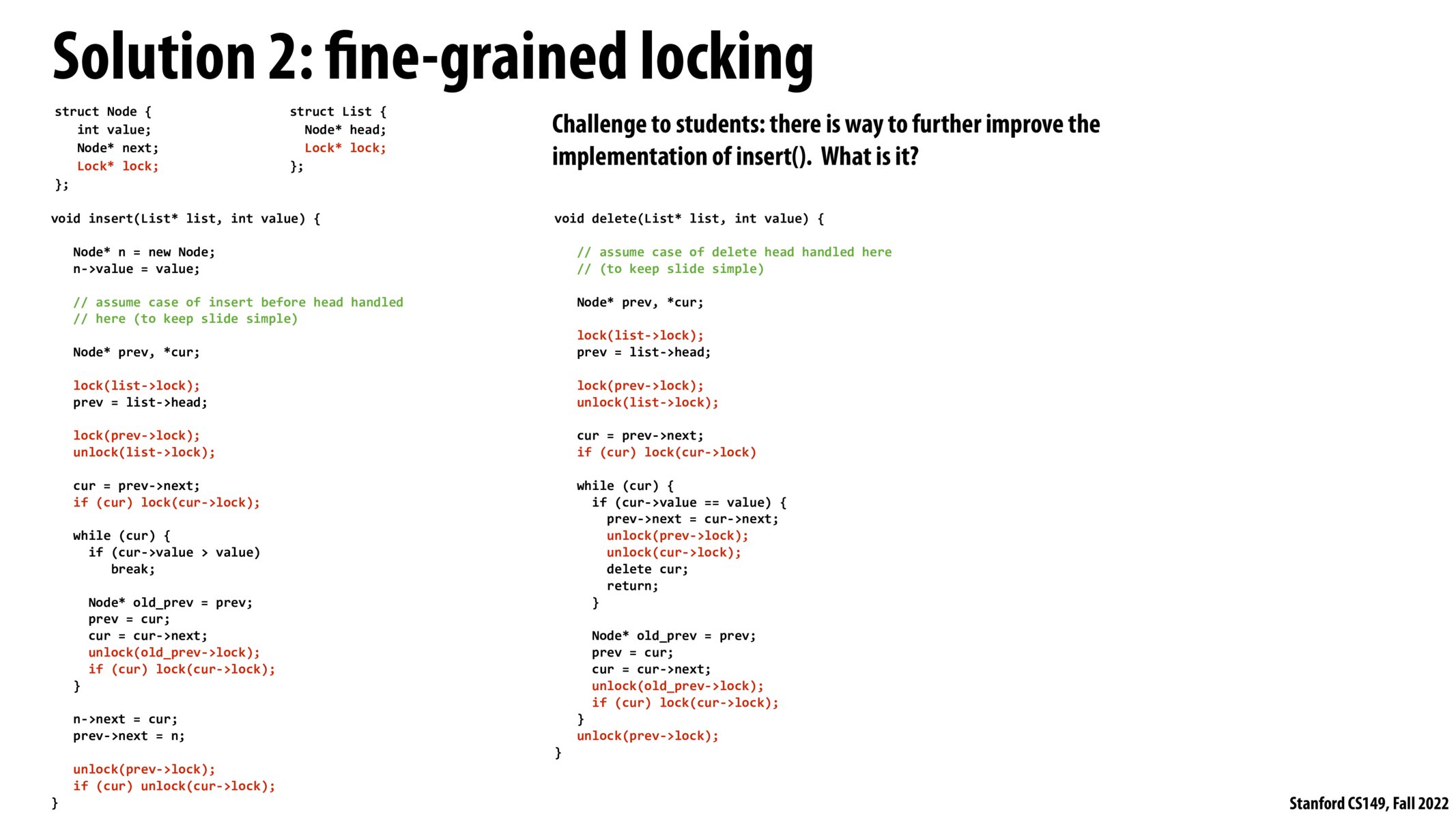Locks, Fine-Grained Synchronization, and Lock-Free Programming #
Terminology #
- Deadlock
- Mutual exclusion: only one processor can hold a given resource at a time
- Hold and wait: processor must hold resource while waiting for other resources it needs to complete an operation
- No preemption: processors don’t give up resources until operation they wish to perform is complete
- Circular wait: waiting processors have mutual dependencies (e.g., cycle exists in dependency resource graph)
- Livelock: system is execution many operations, but no thread is making meaningful progress (e.g. continuous abort and retry)
- Starvation: system is making overall progress, but some processes make no progress
- Usually not a permanent state
More on atomics #
Implementing atomic operations from compare-and-swap #
// atomicCAS: "compare-and-swap"
// performs following logic atomically
int atomicCAS(int *addr, int compare, int val) {
int old = *addr;
*addr = (old == compare) ? val : old;
return old;
}
void atomicMIN(int *addr, int x) {
int old = *addr;
int new = min(old, x);
while (atomicCAS(addr, old, new) != old) {
old = *addr;
new = min(old, x);
}
}
Lock implementation #
Test-and-set based lock #
Atomic test-and-set instruction: ts
- In reality:
cmpxchgin x86, e.g.lock cmpxchg dst, src
Spin lock implementation:
ts r0, mem[addr] // load mem[addr] into r0
// if mem[addr] is 0, set mem[addr] to 1
lock:
ts r0, mem[addr] // load word into r0
bnz r0, lock // if 0, lock obtained, otherwise go back to fn start
unlock:
st mem[addr], #0 // store 0 into mem addr
Test-and-test-and-set lock #
void Lock(int *lock) {
while (true) {
// while another processor has the lock, spin
// (assume *lock is not register allocated)
while (*lock != 0);
// when lock is released, try to acquire it
if (test_and_set(*lock) == 0)
return;
}
}
void Unlock(int *lock) {
*lock = 0;
}
- Performance is better because instead of test-and-set per spin, we keep trying to read the lock, and do only one test-and-set
Ticket lock #
- Main problem with test-and-set style locks: upon release, all waiting processors attempt to acquire lock using test-and-set
- Instead, ticket system:
struct lock {
int next_ticket;
int now_serving;
}
void Lock(lock *l) {
int my_ticket = atomic_increment(&l->next_ticket);
while (my_ticket != l->now_serving);
}
void Unlock(lock *l) {
l->now_serving++;
}
Using locks #
Motivating example: sorted linked list
struct Node {
int value;
Node *next;
}
struct List {
Node *head;
}
void insert(List *list, int value) {
Node *n = new Node;
n->value = value;
Node *prev = list->head;
Node *cur = list->head->next;
while (cur) {
if (cur->value > value)
break;
prev = cur;
cur = cur->next;
}
n->next = cur;
prev->next = n;
}
void delete(List *list, int value) {
Node *prev = list->head;
Node *cur = list->head->next;
while (cur) {
if (cur->value == value) {
prev->next = cur->next;
delete cur;
return;
}
prev = cur;
cur = cur->next;
}
}
- Issues when called with multiple threads
- Simultaneous insertion: both threads may computer same
prevandcur, resulting in one insertion getting lost - Simultaenous insertion/deletion: same issue may cause entire loss of part of list
- Simultaneous insertion: both threads may computer same
Attempt 1: global data structure lock #
struct Node {
int value;
Node *next;
}
struct List {
Node *head;
Lock *lock;
}
void insert(List *list, int value) {
lock(list->lock);
Node *n = new Node;
n->value = value;
Node *prev = list->head;
Node *cur = list->head->next;
while (cur) {
if (cur->value > value)
break;
prev = cur;
cur = cur->next;
}
n->next = cur;
prev->next = n;
unlock(List->lock);
}
void delete(List *list, int value) {
lock(list->lock);
Node *prev = list->head;
Node *cur = list->head->next;
while (cur) {
if (cur->value == value) {
prev->next = cur->next;
delete cur;
unlock(list->lock);
return;
}
prev = cur;
cur = cur->next;
}
unlock(list->lock);
}
- But this is slow! serializes lock usage
Second attempt: hand-over-hand locking #
Lock per node.
